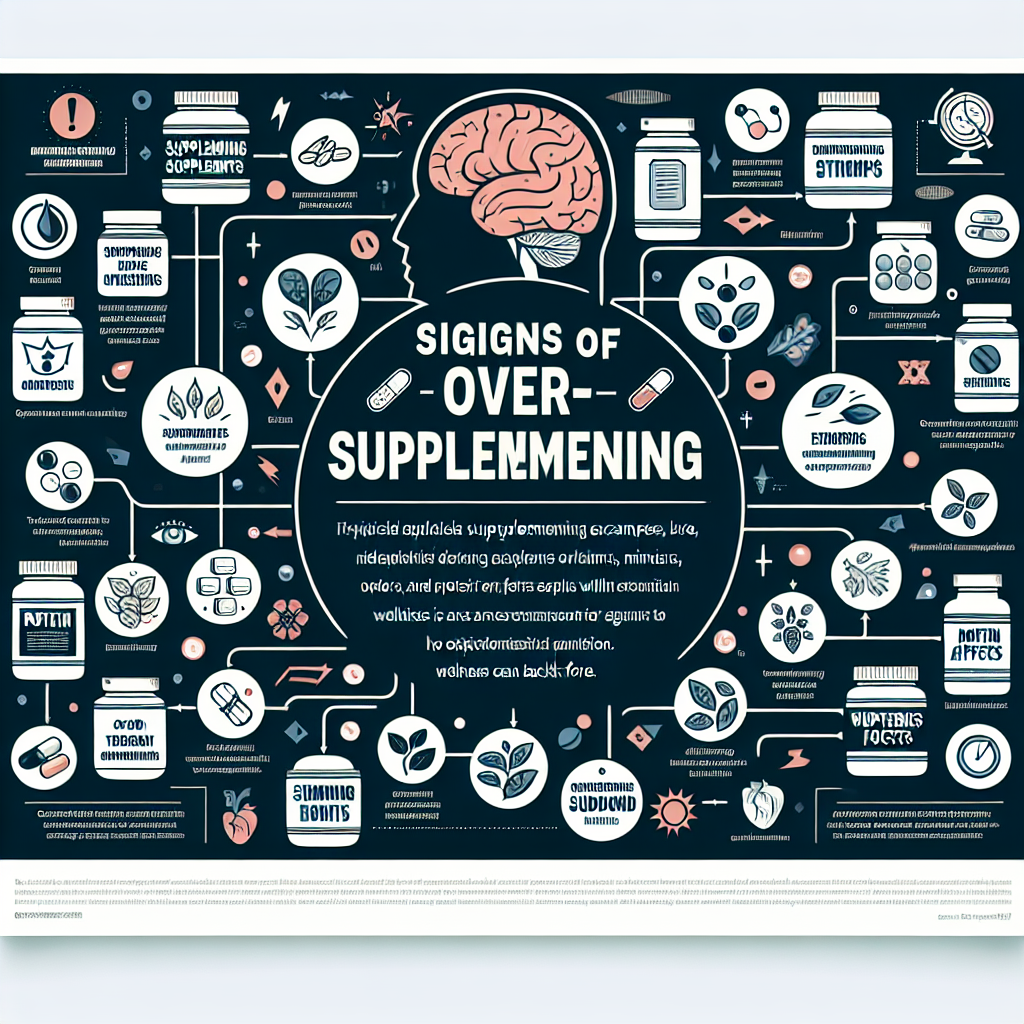Signs You’re Over-Supplementing: When Wellness Backfires

Discover the signs that you’re over-supplementing and learn when wellness backfires. Don’t let your pursuit of health lead to unintended consequences. Visit My Vibrant Vitality now to understand more.
Recognizing the Red Flags: 5 Signs You’re Over-Supplementing
In the pursuit of optimal health and wellness, many individuals turn to dietary supplements. These products, ranging from vitamins and minerals to probiotics and protein powders, promise to fill nutritional gaps, boost energy levels, and promote overall well-being. However, it’s essential to remember that more is not always better. Over-supplementing can lead to a host of health problems, turning your wellness journey into a counterproductive endeavor. Here are five signs that you might be over-supplementing.
Firstly, if you’re experiencing persistent digestive issues, it could be a sign of over-supplementation. While some supplements can cause temporary discomfort as your body adjusts, ongoing symptoms such as nausea, bloating, constipation, or diarrhea may indicate that you’re taking too much of a particular supplement. For instance, excessive intake of iron or magnesium can lead to stomach upset and other digestive problems.
Secondly, frequent headaches or migraines can also be a red flag. Certain supplements, particularly those containing high levels of vitamins A, D, E, and K, can cause headaches when consumed in large amounts. If you’ve started experiencing headaches more frequently since beginning a new supplement regimen, it might be time to reassess your dosage.
Thirdly, unexplained fatigue or lethargy is another potential sign of over-supplementation. While many supplements are marketed as energy boosters, taking too much can have the opposite effect. For example, excessive amounts of vitamin D can cause fatigue, as can an overload of certain B vitamins. If you’re feeling unusually tired despite getting enough sleep and maintaining a balanced diet, your supplement intake could be to blame.
Fourthly, changes in your mood or mental state can also indicate that you’re overdoing it with the supplements. Some supplements, particularly those containing high levels of certain minerals like selenium or copper, can cause anxiety, irritability, or depression when taken in excess. If you’ve noticed a shift in your mood or mental well-being since starting a new supplement, it’s worth considering whether your supplement intake could be a contributing factor.
Lastly, if you’re experiencing unexplained changes in your physical appearance, such as hair loss, skin rashes, or changes in weight, it could be a sign of over-supplementation. For instance, too much vitamin A can lead to hair loss, while excessive zinc can cause skin rashes. Similarly, certain supplements can cause weight gain or loss when taken in large amounts.
In conclusion, while dietary supplements can play a valuable role in supporting health and wellness, it’s crucial to use them responsibly. If you’re experiencing any of the symptoms mentioned above, it might be time to reassess your supplement regimen. Always remember that supplements are not a substitute for a balanced diet and healthy lifestyle. It’s also advisable to consult with a healthcare professional before starting any new supplement regimen, particularly if you have existing health conditions or are taking other medications. After all, the goal of supplementation is to enhance your health, not to undermine it.
When Wellness Turns Harmful: Understanding the Dangers of Over-Supplementing

In the pursuit of optimal health and wellness, many individuals turn to dietary supplements. These products, ranging from vitamins and minerals to probiotics and protein powders, promise a myriad of benefits. However, while supplements can indeed play a crucial role in maintaining and improving health, it’s essential to remember that more is not always better. Over-supplementing, or consuming excessive amounts of these products, can lead to a variety of health issues. This is when wellness, ironically, backfires.
The first sign that you may be over-supplementing is experiencing digestive issues. Many supplements, particularly those rich in iron, magnesium, and vitamin C, can cause stomach discomfort, bloating, and even diarrhea when taken in excess. If you’ve recently increased your supplement intake and are experiencing these symptoms, it may be time to reassess your regimen.
Another common sign of over-supplementing is unexplained fatigue. While many supplements are marketed for their energy-boosting properties, consuming too much can actually have the opposite effect. For instance, excessive intake of vitamin D can lead to fatigue, as it causes high levels of calcium in the blood, which can result in tiredness and lethargy.
Changes in your mood can also indicate that you’re overdoing it with supplements. Certain vitamins and minerals, such as B vitamins and magnesium, are known for their mood-enhancing properties. However, when taken in excess, they can cause a range of mood-related symptoms, including anxiety, irritability, and even depression.
Moreover, over-supplementing can lead to more serious health issues. For example, consuming too much vitamin A can lead to toxicity, which can cause symptoms such as dizziness, nausea, and even hair loss. Similarly, excessive intake of calcium can lead to kidney stones, while too much iron can result in liver damage.
It’s also worth noting that over-supplementing can interfere with the absorption of other nutrients. For instance, high doses of zinc can inhibit the absorption of copper, leading to a deficiency. Similarly, excessive intake of vitamin E can interfere with the body’s ability to absorb vitamin K.
So, how can you avoid over-supplementing? The key is to remember that supplements are just that – a supplement to a balanced diet, not a replacement. It’s always best to get your nutrients from whole foods whenever possible. If you do choose to take supplements, it’s important to stick to the recommended dosages and to consult with a healthcare professional before starting any new regimen.
In conclusion, while dietary supplements can certainly play a role in promoting health and wellness, it’s crucial to use them responsibly. Over-supplementing can lead to a range of health issues, from digestive discomfort and fatigue to more serious conditions like nutrient deficiencies and organ damage. By being mindful of your supplement intake and prioritizing a balanced diet, you can ensure that your pursuit of wellness doesn’t inadvertently backfire.
The Dark Side of Wellness: How to Identify if You’re Over-Supplementing
In the pursuit of optimal health and wellness, many individuals turn to dietary supplements. These products, ranging from vitamins and minerals to probiotics and protein powders, promise to fill nutritional gaps, boost energy levels, and enhance overall wellbeing. However, as with many things in life, there is a point where too much of a good thing can become harmful. This is the dark side of wellness, where over-supplementation can lead to a variety of health issues.
The first sign that you may be over-supplementing is if you’re experiencing gastrointestinal distress. Many supplements, particularly those that are iron-based or contain high levels of certain vitamins, can cause stomach upset, constipation, or diarrhea. If you’re regularly experiencing these symptoms and can’t attribute them to any other cause, it may be time to reassess your supplement intake.
Another sign of over-supplementation is unexplained fatigue. While many supplements are marketed as energy boosters, taking too many or taking them in high doses can actually have the opposite effect. This is because an excess of certain nutrients can put a strain on your kidneys and liver, which are responsible for filtering out waste and toxins from your body. Over time, this can lead to a feeling of constant tiredness or lethargy.
Changes in your mood or mental state can also be indicative of over-supplementation. For instance, excessive intake of certain B vitamins can lead to anxiety, restlessness, and trouble sleeping. Similarly, too much vitamin D can cause depression, while an overabundance of calcium can lead to memory problems and confusion.
Physical symptoms can also be a telltale sign of over-supplementation. For example, taking too much vitamin A can lead to hair loss, while an excess of zinc can cause a loss of appetite and weight loss. Additionally, over-supplementation with vitamin E can increase the risk of bleeding by reducing the blood’s ability to form clots.
Lastly, if you’re finding that you’re getting sick more often than usual, this could be a sign that you’re over-supplementing. While vitamins and minerals are essential for a healthy immune system, taking too many can actually weaken your immune response. This is because an excess of certain nutrients can interfere with the body’s ability to fight off infections and diseases.
In conclusion, while dietary supplements can play a crucial role in maintaining and enhancing health, it’s important to remember that more isn’t always better. Over-supplementation can lead to a variety of health issues, from gastrointestinal distress and fatigue to mood changes and physical symptoms. If you suspect that you’re over-supplementing, it’s important to consult with a healthcare professional. They can help you assess your supplement intake and make necessary adjustments to ensure that you’re getting the right amount of nutrients for optimal health and wellness. Remember, the goal of supplementation should be to complement a balanced diet, not to replace it.